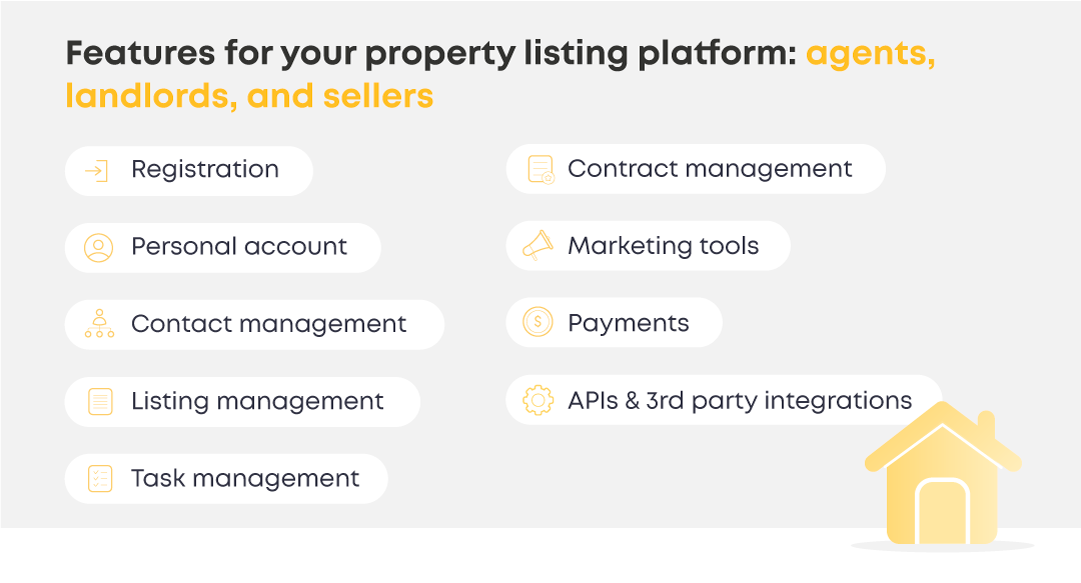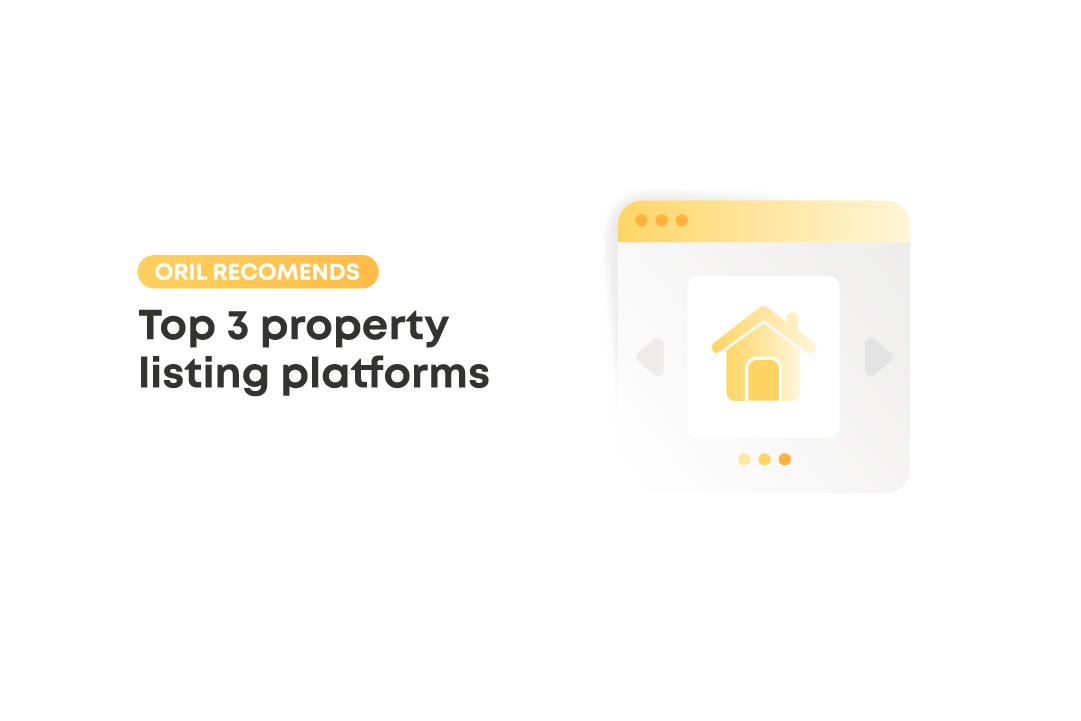Did you know that according to the National Association of Realtors Profile of Home Buyers and Sellers, 51% of buyers found the property they purchased on the internet? In contrast, only 7% happened to notice their future home from a yard sign, and only 28% through their realtors.
The best place to find, sell, or rent real estate in the web is through property listing platforms. These digital solutions are booming now because they make the process of searching for real estate easier for buyers. At the same time, sellers have a better chance of getting their units seen. A win-win.
So, what are the best property listing platforms? We’ll look at the apps we at ORIL believe to drive the most value. You will also learn what features to consider if you are an agent or a buyer.
What features to look for in property listing platforms?
As the real estate software market is projected to reach $15. 8 billion by 2027, we can expect it to brim with sophisticated and high-performance platforms meant to facilitate relationships between sellers, agents, brokers, developers, financial institutions, and buyers. But how do you pick the best one from the variety of options available on the market? We suggest paying attention to these basic technical and usability parameters:
- Website speed. Are listing feeds loading quickly? How much does it take for high-resolution images or videos to load? If it takes more than a few seconds for the page to load, this can cost you a conversion (if you are an agent) and lead to poor user experience (if you are a property buyer).
- Responsiveness. Is the platform accessible from all devices? Are all elements displayed adequately across mobile, tablet, or computer? Is there a standalone mobile app for convenience? 74% of homebuyers search for information from their cell phones and tablets, meaning that the platform should be optimized for mobile as well as computer users.
- Security. What measures does the platform have in place to protect confidential information? How does it ensure the privacy of both agents and their clients? 74% of companies in real estate are not prepared for cyber attacks, so make sure you pick the platform that follows the best security practices.
- Onboarding. Does the platform provide a user-friendly demo or offer free onboarding sessions? Are other training resources available that enable agents to quickly adopt the new digital solution? Effective onboarding reduces the time users need to achieve their first value by 34%.
- Customer support. Does the platform enable you to connect with the customer care team? What communication channels are available? What is the average response time? The survey suggests that the ability to quickly resolve the issue, real-time support 24/7, and an option to pick the desired contact method are the key indicators of a good customer service experience.
As real estate listing platforms allow their users to buy, rent, and sell property, their functionality will differ depending on your role. Below, we will break down the features we believe to be important for everyone involved in selling/leasing and buying/renting property.
Features for your property listing platform: agents, landlords, and sellers

| Feature | Key aspects |
| Registration |
|
| Personal account |
|
| Contact management |
|
| Listing management |
|
| Task management |
|
| Contract management |
|
| Marketing tools |
|
| Payments |
|
| APIs & third-party integrations |
|
Features for property listing platforms: buyers and tenants
| Feature | Key aspects |
| Registration |
|
| Personal account |
|
| Search engine with categories & filters |
|
| Detailed listings |
|
| Calculators |
|
| Contact & inquiry management |
|
| Payments |
|
| Rental property management |
|
The best property listing platforms: ORIL recommends
Zillow
The first platform on our list is the most popular real estate and rental marketplace online and one of the most downloaded apps on both Android and iOS. Zillow connects customers with helpful local professionals and empowers them with data, inspiration, and knowledge.
On Zillow, you can search for homes and apartments, list your properties for sale or rent, tour the properties through pictures and videos, connect with agents and lenders, save your searches, and receive push notifications whenever your search criteria update.
Pros:
✔️ It is free for buyers as well as sellers, agents, and landlords who sell or rent out their property.
✔️ Largest database of over 135 million properties.
✔️ Extensive criteria sorting.
✔️ Links to get pre-qualified financing.
✔️ Volumes of “how-to” guides about home buying and selling.
✔️ Ease of use – a suite of mobile apps is available so you can do your research anywhere.
✔️AI-powered natural-language search to improve the property search results.
✔️In-app connection feature in the Zillow Premier Agent app to access information about agents’ connections and the properties prospects are interested in.
Cons:
❌ Their Zestimate algorithm is limited by the information it has to work with.
❌ Realtors and lenders pay for leads on the site. If users do not wish to interact with agents, they should avoid completing on-site forms.
❌There may be a potential bias toward Premier Agents as inquiries about a property are often directed to these Premier Agents instead of the listing agent.
Zillow is the most popular property listing app due to its extensive database and ease of use. Although it may be difficult for users who don’t want to deal with agents, it is still an excellent platform for real estate search.
Trulia
Trulia is particularly attractive and famous for its large database (over 3.5 million listings) and additional information it displays on the map of each home’s surrounding area. Trulia shows you the recent sales in the area, local schools, crime rates, public transportation options, and other valuable data that is not as easily available on other platforms.
On Trulia, the listing information is generally provided by agents, website vendors, brokers, and Multiple Listing Services (MLS). However, it also gets listing details from For Sale by Owner homes listed on Zillow (Trulia is a Zillow subsidiary). The platform also has a proprietary estimation tool that helps break down the actual cost of purchasing a home into monthly installments.
Pros:
✔️ It shows the quality of nearby schools, the crime rate in the area, nearby amenities, and more on an easy-to-use heat map.
✔️ Alerts for new listings and sorting by property type, area, or other features.
✔️ Automatic display of similar for-sale and sold properties.
✔️ Ability to connect with other real estate professionals like mortgage brokers, lenders, or real estate agents directly from the site.
Cons:
❌ Some properties will have limited information if the property appraiser website isn’t easily accessible.
❌ Occasional problems with updates. The unit may still be listed as available when it is not.
❌The user interface is less intuitive and may be harder to navigate than other platforms
Although Trulia may have a smaller database than Zillow, it gives far more information per unit, and that’s a great feature. Careful though, some properties still listed as available on the site can already be sold.
Realtor.com
Realtor.com is the second-largest real estate marketplace on the internet with over 40 million visitors monthly, and it is not hard to see why. Realtor.com provides its users with a comprehensive set of features at both free and paid levels. It also has excellent tools to generate and nurture leads for you as a realtor.
While all the other platforms are primarily for users and customers, Realtor.com is for agents, helping them boost their presence and establish their businesses. It has the most trusted online listing since it is affiliated with the National Association of Realtors and linked to over 580 regional MLS. So chances are, whatever you see on Realtor.com is legit.
The app allows you to search for homes, view pictures and video tours, compare neighborhood criteria like noise levels, and all its listings are updated in real-time.
Pros:
✔️ It includes 99% of all MLS-listed properties.
✔️ Easy to search.
✔️ Links to get pre-qualified financing and financial calculators for buyers.
✔️ Robust “find a realtor” feature.
✔️ Enhanced listing intelligence suite of features that help agents match listings with buyers based on their inquiries on the website.
✔️Gives agents insights into their listings’ level of completeness, along with suggestions on improvements.
Cons:
❌ Not as user-friendly as other listing websites, making it a less appealing option for those who seek user interface over data.
❌ No option to search “for sale by owner” listings.
❌ No option for home sellers to list their property for sale directly — only via MLS and then marked to display on the internet.
There is the sense that Realtor.com was not really built with the average user in mind as it prioritizes data over UI. It’s hard to use for everyone except realtors. Also, it only includes MLS-listed property, limiting user options. However, from the accuracy and data availability standpoint, it is one of the best.
Learn more about the best property management software
for homeowners and investors in our blog.
Zillow vs Trulia vs Realtor. com: How they stack up against each other
| Price | Ease of Use (1-10) | Most valued features (by users) | Limitations | Support | |
| Zillow | ?FSBO listings are free ? Flex referral fee – from 20% to 35% of the commission ?Premier Agent – ~$200/mo and higher | 8.8 | ✔️Collaboration Tools ✔️Access Controls/Permissions ✔️Document Management ✔️Alerts/Notifications ✔️File Sharing ✔️API ✔️Third-Party Integrations ✔️Task Management ✔️AI-Powered Property Search ✔️ Agent Profiles ✔️ Mortgage Calculators ✔️ Advertising & Marketing Tools ✔️ Premium Listings & Profiles | ❌ Lack of options on the mobile view vs the desktop view ❌ Some integrations may not work out | ***** very responsive ? Phone Support ? FAQs/Forum ? 24/7 (Live rep) ? Email/Help Desk ? Chat ? Knowledge Base |
| Trulia | ?Free to sign up and list property ?Free for agents and landlords ?$29 fee for tenants for an unlimited number of participating rentals for 30 days | 8.5 | ✔️ Detailed Home listings ✔️ Trulia Neighbourhood ✔️ Agent Profiles ✔️ Home Buying Alerts ✔️ CMA Tools ✔️ Mortgage, Affordability, Refinance Calculators ✔️ CRM Integration ✔️ MLS Integration ✔️ API ✔️ Advertising & Marketing Tools ✔️ Premium Listings & Profiles | ❌ Can be slow to update listing information when a property is expired/ sold ❌ Filtering options may not work correctly
| ***** very responsive ? Phone Support ? FAQs/Forum ? 24/7 (Live rep) ? Email/Help Desk ? Chat ? Knowledge Base ? FB/ Messenger |
| Realtor.com | Free sign-up for realtors ? Users will pay commission fees to agents | 7.0 | ✔️ Listing Syndication ✔️ Listing Management Portal ✔️ Virtual Home Tours ✔️ Custom Notification Alerts & Widgets ✔️ CMA Tools ✔️ Mortgage Calculators ✔️ CRM Integration ✔️ MLS Integration ✔️ Premium Listings & Profiles ✔️ Agent Profiles | ❌ Impossible to remove map boundaries in searches ❌ Sold homes just disappear rather than get marked as “sold” ❌ Lead management feature needs improvement ❌ No API | **** fairly responsive ? Phone Support ? FAQs/Forum ? 24/7 (Live rep) ? Email/Help Desk ? Chat ? Knowledge Base |
Conclusion
Each of these platforms has its specific pros and cons, but they all stand out due to the wide range of tools they offer to buyers, sellers and agents. The overview we’ve provided in this article should help you determine which of these options is right for you.
Or maybe you have an idea for your own property listing platform? Let’s make it work! Reach out to our software development team for a consultation.







